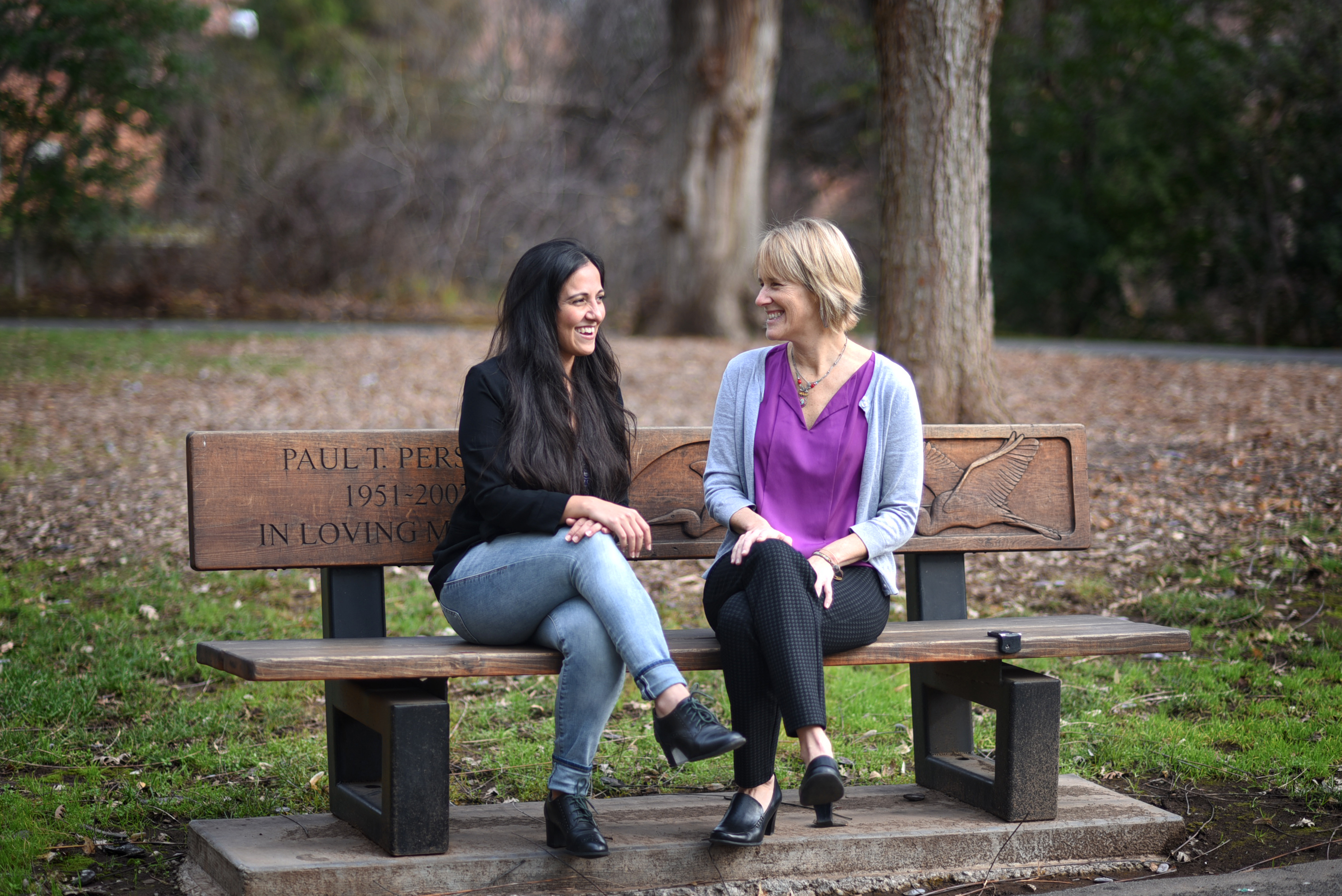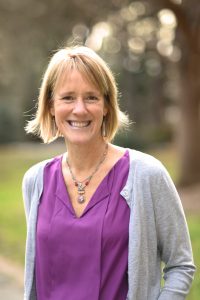‘Poverty Scholar’ Susan Roll Sheds Light on Welfare System Flaws

Professor Susan Roll (right) and her former research assistant Mona Kazemi (left) surveyed 150 low-income Butte County families as part of their research into government child care subsidies. (Jessica Bartlett / Student Photographer)
Meet Susan Roll, a self-described “poverty scholar.”
Through interviewing families living on minimum wage, examining government policy, and testifying before state committees, the associate professor in the School of Social Work is striving to elevate the quality of life experienced by people who are struggling to afford everyday necessities.
“I don’t think I’m going to solve poverty, but if I can start—that’s the idea,” she said.
When Roll returns to the classroom this month, she will bring plenty of real-world insight to share with her students about a major catch-22 facing many low-income families in Butte County and across the nation. It’s called a “benefits cliff,” and figuring out a solution has consumed her life for years.
The term refers to the point where government-paid subsidies, including those for child care assistance, keep poor families vulnerable—if their income rises just above the threshold, they’ll lose their eligibility, although they cannot afford to pay for those services on their own.
Roll’s research has shed light on this flaw in the current benefits system, thanks to a University fellowship designed to give professors the freedom to dig deeply into issues that matter.

Roll received the Lantis Endowed University Chair Award in 2015 and has used the prestigious, $40,000 prize to continue her research into solutions to the world of poverty.
The award is named after David Lantis, a former faculty member in the University’s Department of Geography and Planning who believed private giving enriches the University’s teaching and learning environment. Through a series of gifts, he and his wife, Helen, established the scholarship fund, which at more than $2 million is one of the largest endowments at the University.
“What I can now share with my classes about why families remain on welfare is really profound. This scholarship opportunity allows me to bring that knowledge to the classroom and makes me a better teacher,” said Roll, a social worker-turned-academic who joined Chico State in 2012.
With the Lantis award, she also advanced her desire to positively impact her community.
“I wasn’t interested in sitting at a computer all day and crunching numbers. I wanted to be with social workers, and I wanted to still be working in the community,” Roll said.
Roll has also been appointed to be the University’s new director of civic engagement, starting with the spring semester. In that position, she will work with faculty members to enhance the civic component of their classes and help create partnerships between the campus and the broader community. “I look forward to building and strengthening these opportunities so that faculty and students can further engage in mutual problem solving, research, and scholarship for the benefit of the North State,” Roll said.
It all started with the 10 years Roll spent as a social worker in Southern California and Boston with nonprofit groups that developed policies related to domestic violence and women’s health, and continued with her PhD research into government poverty policies while at the University of Denver.
“We have lots of myths and ideas about people on welfare, and what I discovered is that every person I met didn’t want to be on welfare but they get trapped in barriers that are built in with social welfare policies,” she said.
After coming to Chico State five years ago to teach courses on diversity and family policy, Roll started a poverty simulation workshop with Recreation, Hospitality, and Parks Management professor Laurie Browne.

Still, Roll couldn’t help but wonder about low-income families in the North State.
Armed with the Lantis award, she embarked on a 14-month study on low-income child care in Butte County in 2015, in partnership with Valley Oak Children’s Services, a Chico nonprofit that administers the child care benefit voucher program.
She continued her writing about and advocacy for low-income families during a sabbatical taken during the fall semester.
Her research confirmed that the higher a person’s wages rise, the less in benefits the family is eligible to receive. That means for, say, a department store cashier, fast food cook, or elder caregiver, a tiny raise could push their earnings “over the cliff.” The result is the loss of state-subsidized assistance, including food stamps, utility subsidies, and child care—the most costly benefit of all for employees who are still firmly among the working poor.
Some low-income employees turn down raises to keep their subsidy, an action with negative implications for the long term. Forgoing pay raises not only means lower annual salaries, Roll explained, but translates to less pay once their children outgrow the need for daycare and even follows workers into retirement by way of lower Social Security payouts, which are based on earnings.
While men can be impacted by the benefits cliff, about 98 percent of workers found through Roll’s research were single women.
About 30 percent of the heads of families that Roll surveyed in Butte County last year reported passing up pay raises in order to keep their child care benefit. Otherwise, they would have risked losing a $1,000-a-month benefit just to get a 50-cent-per-hour raise. Some people reported not getting married or collecting child support payments if that would boost their income beyond the benefits threshold.
“I say these women are as smart as anyone on Wall Street because they know how to handle their money,” Roll said. “They are just being smart, like any of us would do with our family budgets.”
Lantis funds allowed Roll to hire two graduate students, Mona Kazemi and Tammy Ramsey, as research assistants. The team surveyed 150 low-income families and went on to conduct in-depth interviews with 10 who were receiving child care subsidies.

In December, Roll and Kazemi presented their findings to the Child Care Policy Interagency Workgroup, a collection of key government advisors that advise and develop how California implements subsidized child care policies.
In addition to driving important research, Kazemi said Roll gave her the support she needed as a student working to complete her master’s degree.
“She really pushed me out of my comfort zone to get involved, take on leadership roles, and do presentations,” said Kazemi, who graduated in May and now works as a policy and program specialist with the California Alternative Payment Program Association, which advocates for low-income families. “She also took the time to teach me, not just throw [me] in to sink or swim. . . .She pushes you to be the best.”
Roll considers her research and advocacy to have contributed to federal legislation taking effect this year to allow workers to remain eligible for child care subsidies for an entire year, even if their income rises above the benefits cutoff, giving families time for a transition from government help.
“This whole [experience] is a great example of how advocacy actually works to change policy. Being able to teach social workers how to do advocacy and show them that it’s actually effective is pretty awesome,” Roll said.


